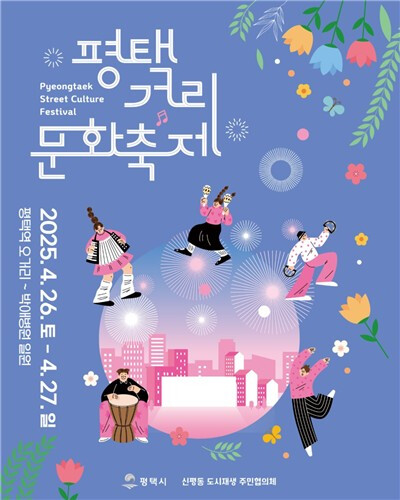
Pyeongtaek City, Gyeonggi Province, South Korea, has announced the launch of a vibrant new initiative aimed at revitalizing the Shinpyeong-dong urban regeneration zone. Starting this month and continuing through November, the city will host the "Pyeongtaek Street Culture Festival" on the last Saturday of each month. This cultural endeavor seeks to inject energy into the area, foster community spirit, and attract visitors.
As part of the broader urban regeneration project for the Shinpyeong district, this monthly street culture festival promises a diverse array of attractions. The inaugural event is scheduled for the weekend of April 26th and 27th and will transform a 180-meter stretch between Pyeongtaek Station Rotary and Park-ae Hospital into a lively hub of activity.
The festival's program is designed to appeal to a wide audience. A key component will be a series of captivating street performances featuring local artists. These performances are expected to showcase a variety of artistic disciplines, adding a dynamic and engaging atmosphere to the area. In addition to the performances, the festival will host a "free market" or flea market, providing an opportunity for local vendors and artisans to showcase and sell their goods. Interactive experience zones will also be set up, offering visitors hands-on activities and opportunities for engagement.
Organizers have confirmed that the festival will take place on the last Saturday of each month, with the exception of the month preceding the upcoming presidential election, presumably to avoid any potential disruption or overlap with election-related activities. Notably, the events in April and September are planned as two-day affairs, suggesting a larger scale and potentially a more extensive program for these specific months.
The Pyeongtaek City authorities are optimistic about the festival's potential impact, projecting an average daily attendance of approximately 3,000 tourists and local residents. This influx of visitors is expected to provide a significant boost to the local economy, particularly for businesses operating within the Shinpyeong district.
A representative from Pyeongtaek City articulated the rationale behind the initiative, stating, "We have planned this street culture festival to revitalize the commercial district of the Shinpyeong area and to foster the recovery of the local community spirit." The official further emphasized the city's hopes for the event, extending an invitation not only to the citizens of Pyeongtaek but also to residents of neighboring municipalities to come and experience the festivities.
Shinpyeong District and Urban Regeneration Efforts
The Shinpyeong-dong area has been identified as a key district for urban regeneration efforts in Pyeongtaek. Urban regeneration projects in South Korea are often implemented to address issues such as aging infrastructure, declining commercial activity, and a need for enhanced community spaces. These projects typically involve a multi-faceted approach, including infrastructure improvements, the creation of cultural and recreational facilities, and initiatives to support local businesses and residents.
Pyeongtaek City's focus on Shinpyeong likely stems from a desire to breathe new life into a historically significant or strategically located area. The proximity to Pyeongtaek Station, a major transportation hub, suggests that Shinpyeong has the potential to become a vibrant and accessible part of the city. By implementing urban regeneration strategies, the city aims to create a more attractive environment for residents, businesses, and visitors alike.
The Role of Culture in Urban Revitalization
The integration of cultural events, such as the Pyeongtaek Street Culture Festival, is a common and effective strategy in urban regeneration projects worldwide. Cultural initiatives can play a crucial role in:
Attracting Visitors: Festivals and events draw people to the area, increasing foot traffic and spending at local businesses.
Enhancing Community Identity: Cultural events provide opportunities for residents to come together, fostering a sense of belonging and shared identity.
Improving Quality of Life: Access to cultural activities and vibrant public spaces contributes to a higher quality of life for residents.
Promoting Local Arts and Talent: Festivals offer a platform for local artists and performers to showcase their skills, enriching the cultural landscape of the city.
Creating a Positive Image: Successful cultural events can enhance the image of the area, making it more attractive for investment and development.
By hosting a recurring monthly festival, Pyeongtaek City is aiming to create a sustained vibrancy in the Shinpyeong district, rather than a one-off event. This consistent programming can help to establish the area as a destination for culture and entertainment.
Pyeongtaek City: A Hub of Growth and Culture
Pyeongtaek City is a significant urban center in Gyeonggi Province, known for its strategic location and dynamic growth. Home to major industrial complexes, including the Pyeongtaek Port and various manufacturing facilities, the city also hosts a substantial international community due to the presence of U.S. military bases. This unique blend of industry, international influence, and local culture contributes to Pyeongtaek's distinct character.
Efforts to enhance the city's cultural offerings and urban environment are crucial for ensuring its continued growth and attractiveness as a place to live, work, and visit. The Pyeongtaek Street Culture Festival in the Shinpyeong district represents a positive step in this direction, leveraging the power of culture to revitalize a key urban area.
Looking Ahead
The success of the Pyeongtaek Street Culture Festival will likely be evaluated based on factors such as attendance numbers, the participation of local businesses and artists, and the overall impact on the atmosphere and economic activity in the Shinpyeong district. The monthly recurrence of the festival provides an opportunity for ongoing engagement with the community and for adjustments to the program based on feedback and observations.
As Pyeongtaek City embarks on this cultural initiative, the hope is that the "Pyeongtaek Street Culture Festival" will become a beloved local tradition, contributing significantly to the revitalization of the Shinpyeong district and enhancing the cultural vibrancy of the entire city. The enthusiasm of city officials and the planned diverse program suggest a promising future for this endeavor, with the potential to create a lasting positive impact on the heart of Pyeongtaek.
[Copyright (c) Global Economic Times. All Rights Reserved.]






























